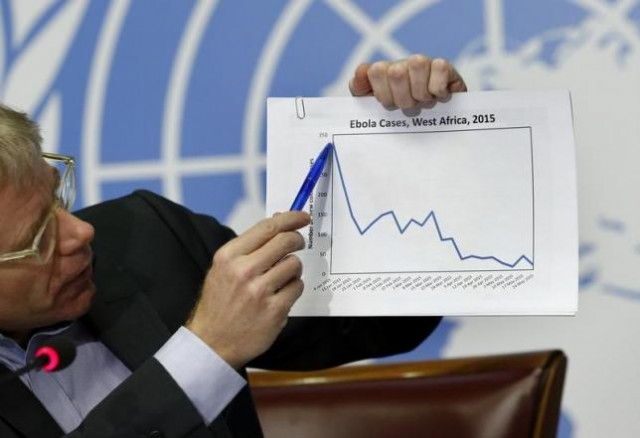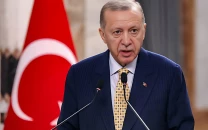Two new Ebola cases in Guinea, WHO says
WHO has warned against prematurely assuming the outbreak is over because the virus could pop up again in 42 days

Bruce Aylward, Assistant Director-General for Emergencies at the World Health Organization shows a graph during a news conference on Ebola aside of the World Health Assembly at the United Nations in Geneva, Switzerland, May 26, 2015. PHOTO: REUTERS
WHO spokeswoman Margaret Harris told a UN briefing in Geneva that one case was in Forecariah, western Guinea, and appeared to be linked to a previously known chain of infection, while the other was in the capital Conakry.
Read: Village of 1,000 quarantined after Ebola death in SLeone
Ebola transmission is considered to be over once a locality has gone 42 days without a new case of the disease. The other two countries that were worst hit by the epidemic were Liberia, which was declared transmission free on Sept. 3, and Sierra Leone, which is counting down another 22 days until it is clear.
Read: Ebola vaccine passes early safety test
The worst outbreak on record has been largely stopped in its tracks after killing more than 11,000 people.
But the WHO has repeatedly warned against prematurely assuming the outbreak is over because the virus could pop up again until the 42 days are over.
"On the bumpy road we keep talking about, the high risk of recurrence, once again we are navigating a few bumps," Harris said. "Of course we didn't want it, but we did expect it. Guinea hadn't got to the stage where we were looking at 42 days."
Even after that period, Ebola may lurk in the population. This month a study showed the semen of male survivors can harbour the virus for nine months, while a British nurse has fallen critically ill again 10 months after recovering from Ebola.
Read: Vaccine offers 100% Ebola protection: trial results
The medical toolkit for tackling Ebola has been transformed in the past few months by the success of a trial vaccine, which is now used to treat each new case and their contacts who may also be at risk from the highly contagious virus.
But Harris said that the trial comes to an end in mid-November, potentially putting a question mark over the use of the vaccine beyond that date.


1725099588-0/BeFunky-(41)1725099588-0-208x130.webp)
















COMMENTS
Comments are moderated and generally will be posted if they are on-topic and not abusive.
For more information, please see our Comments FAQ